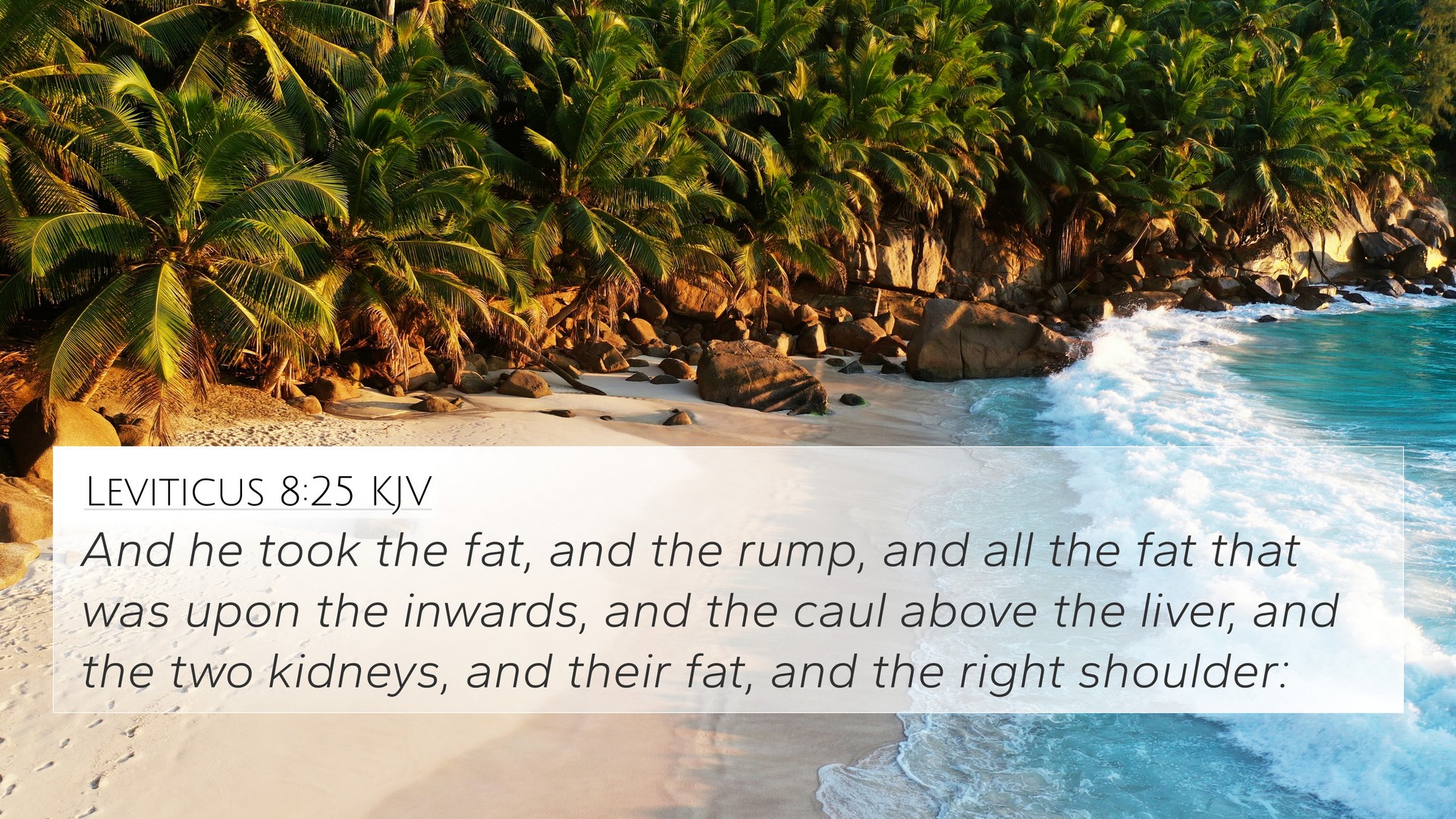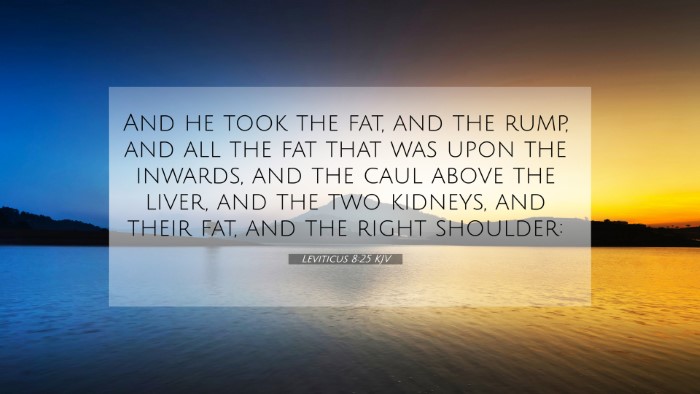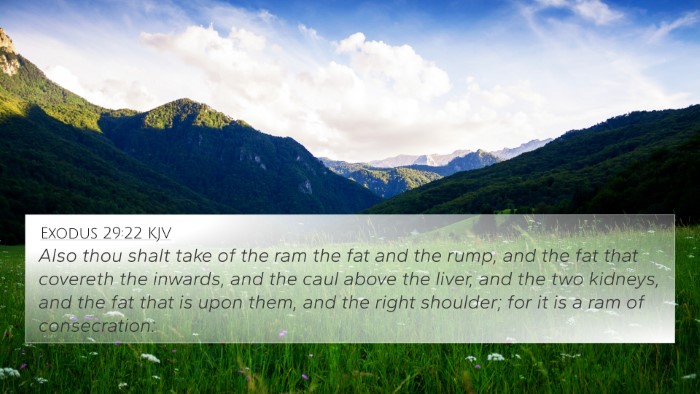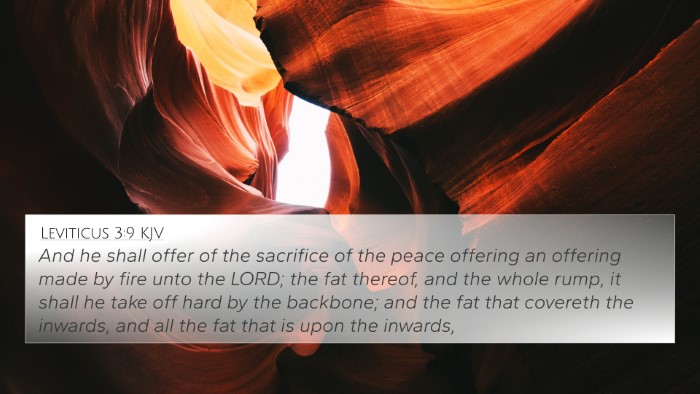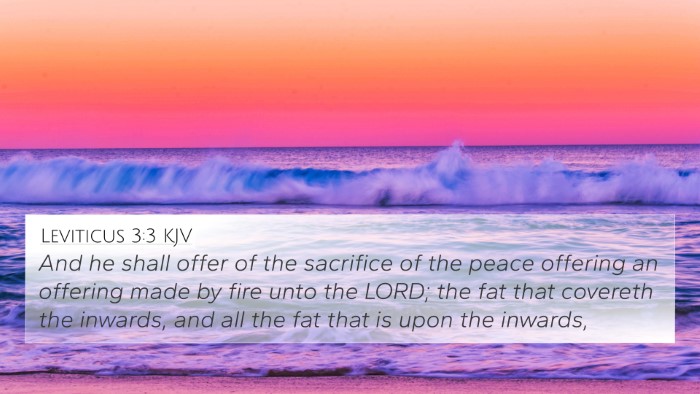Understanding Leviticus 8:25
Leviticus 8:25 states: "And he took the fat, and the fat of the kidneys, and the caul above the liver, and offered them upon the altar." This verse is part of the rite of consecration for Aaron and his sons as priests.
Summary of Meaning
This verse illustrates the meticulous and symbolic nature of the sacrificial system in the Old Testament. The act of offering specific parts of the animal signifies the dedication of the entire being to God and the importance of purity in worship.
Insights from Public Domain Commentaries
Matthew Henry's Commentary
Matthew Henry emphasizes the concept of ritual purity and the deepening relationship between God and His chosen ones. The offering of the fat, regarded as the best part of the sacrifice, indicates God's claim on the lives of the priests and their role as mediators between Him and the people.
Albert Barnes' Notes
Albert Barnes points out that the fat and organs offered symbolize the internal spiritual state and the dedication of one's inner life to God. The mention of specific parts highlights the care required in approaching holy duties and the significance of proper sacrifice.
Adam Clarke's Commentary
Adam Clarke adds that the ceremonial aspects discussed illustrate the spiritual truths that underline the sacrificial system, pointing to a future completeness in Christ. Clarke suggests that these sacrifices were foreshadowing, setting a precedent for the ultimate sacrifice offered by Jesus Christ.
Connections to Other Bible Verses
Leviticus 8:25 can be understood in the broader context of scripture through various connections. Here are key Bible cross-references:
- Exodus 29:22 - More instructions on offerings during consecration.
- Leviticus 3:16-17 - Regulations regarding the holiness of fat offerings.
- Hebrews 10:1-4 - Reflection on the heart of the sacrificial system in conditioning one’s relationship with God.
- Romans 12:1 - The call to present our bodies as living sacrifices, linking to the sacrifice theme.
- Psalm 51:17 - God's desire for a broken spirit; highlighting inner dedication over outward ritual.
- 1 Peter 2:9 - The priesthood of believers, establishing a connection to Levitical practices.
- John 1:29 - Jesus as the Lamb of God, connecting the sacrificial symbolism to Jesus' ultimate sacrifice.
- Hebrews 9:9-14 - A deeper discussion on the significance of worship practices and sacrifices.
- 2 Corinthians 2:15 - Our lives as a sweet aroma to God, paralleling the sacrificial offerings.
- Malachi 1:8 - Bringing blemished offerings is a reflection on the importance of purity in sacrifices.
Thematic Bible Verse Connections
In exploring thematic Bible verse connections, we find that Leviticus 8:25 speaks to key doctrines such as:
- Holiness - The requirement of holiness in worship and living.
- Representation - The priest's role as a mediator between God and the people.
- Sacrifice - The importance of sacrifices in addressing sin and maintaining a relationship with God.
- Dedication - The call to dedicate our lives wholly to God, modeled by the priests.
Tools for Bible Cross-Referencing
To gain deeper insights, utilizing tools for Bible cross-referencing such as a concordance or a cross-reference Bible study guide can enhance your understanding of how verses connect within the scripture.
How to Use Bible Cross-References
Understanding how to use Bible cross-references involves:
- Identifying key terms and themes.
- Following verses that elaborate or expand upon these themes.
- Engaging in cross-referencing Bible study methods to develop a comprehensive understanding.
Conclusion
Leviticus 8:25 serves not just as a historical account but as an enduring spiritual principle regarding the necessity of purity, dedication, and the profound nature of sacrifice in our relationship with God. Many Bible verses relate to this theme, providing rich avenues for deeper study and reflection through Bible verse parallels.
